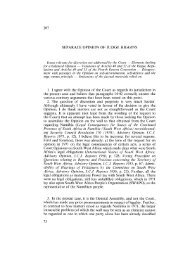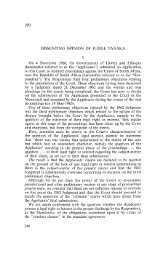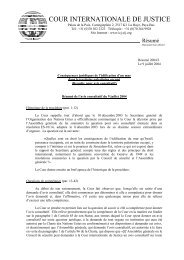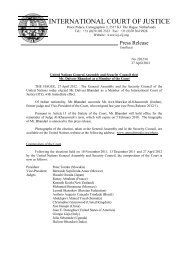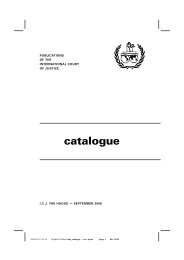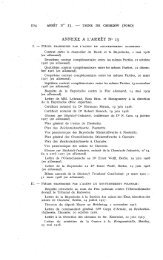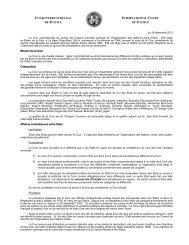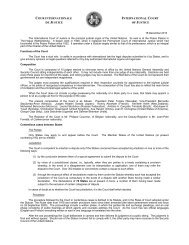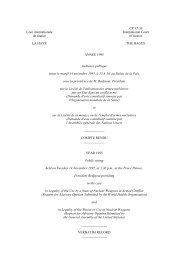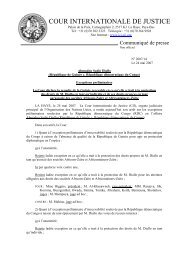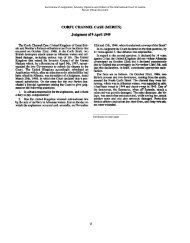botswana/namibia - Cour international de Justice
botswana/namibia - Cour international de Justice
botswana/namibia - Cour international de Justice
You also want an ePaper? Increase the reach of your titles
YUMPU automatically turns print PDFs into web optimized ePapers that Google loves.
invoked on the basis that it pre-dated the Anglo-German Agreement of 1890. This position<br />
appears in the concluding paragraph of Chapter III of Part Two of Namibia's Memorial.<br />
"In short, the official documents, particularly those generated by the 1948-1951 negotiations<br />
of the Trollope/Dickinson agreement, paint a picture that is fully consonant with the witness<br />
testimony heard by the JTTE and goes far to corroborate the general tenor of that testimony.<br />
What they reveal is that from the beginning of the colonial period at least and probably a good<br />
<strong>de</strong>al further back than that, Kasikili Island was agricultural land cultivated by the people<br />
occupying what is now the Eastern Caprivi. Their occupation was continuous, exclusive and<br />
uninterrupted, insofar as the physical conditions of the Island allowed. That is, the villagers<br />
planted, tilled and harvested each year, leaving the Island only with the arrival of the<br />
floodwaters. Kasikili Island/Kasika was a well organised village community, with a chief and<br />
at times with a school - its centre of gravity moving from one pole to the other in accordance<br />
with the dictates of the annual flood." (emphasis supplied). (Namibian Memorial, p.85, para.<br />
217).<br />
702. As has been pointed out in Chapter 1, the village was not on the island but at Kasika.<br />
However, the major difficulty with this passage is that it relates the task of discovering a basis<br />
for a belief in the existence of title not to public <strong>international</strong> law but to the local customary<br />
law prevalent before the process of colonial partition. Thus, not only is the Anglo-German<br />
Agreement set asi<strong>de</strong>, but also general <strong>international</strong> law as the appropriate 'applicable law'.<br />
This approach is clearly inconsistent with the provisions of Article III of the Special<br />
Agreement.<br />
(iii) In the period 1890 to 1948 there was no dispute and no suggestion by any German<br />
or South African official that the island formed part of South-West Africa<br />
703. In the period 1890 to 1948 there was no dispute relating to the boundary in the vicinity of<br />
Kasikili/Sedudu Island. In<strong>de</strong>ed, as the Namibian Memorial recognises, the process of<br />
establishing German administration in the Eastern Caprivi only began in 1909. In these<br />
circumstances there could be no possibility of an adverse possession and, more particularly,<br />
no possibility of a possession based upon a belief that the 'main channel' was the southern and<br />
eastern channel.<br />
704. In the period 1890 to 1948 no single official on either si<strong>de</strong> of the boundary suggested<br />
that the island lay within South-West Africa. The absence of any dispute prior to 1948 is<br />
documented in Chapter 1. It was Major Trollope, acting on his own initiative in 1948, who<br />
first sought to change the status quo. Moreover, Trollope recognised that there had been no<br />
dispute previously: see Chapter 1, paras. 48-9. He also accepted that the northern and western<br />
channel constituted the 'main channel': see below, para.745.<br />
(iv) From 1948 onward South Africa was aware of the existence of a dispute and had<br />
accepted that the northern and western channel constituted the 'main channel' in terms<br />
of the Anglo-German Agreement<br />
705. In the period 1948 to 1951 the dispute surfaced as a result of the initiative of Major<br />
Trollope, Chief Administrator of the Eastern Caprivi, in support of the claims of Mr. Ker,<br />
acting on behalf of the Zambesi Transportation and Trading Company, to use the northern<br />
channel of the Chobe River without the permission of the Government of the Bechuanaland<br />
Protectorate.



